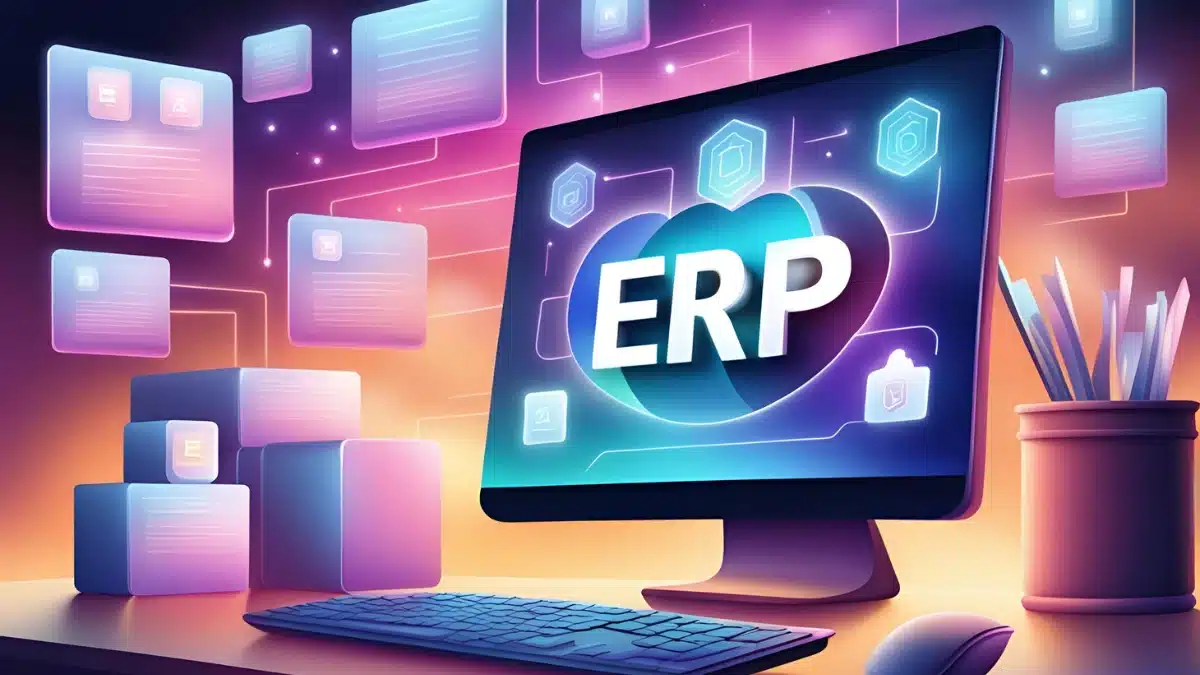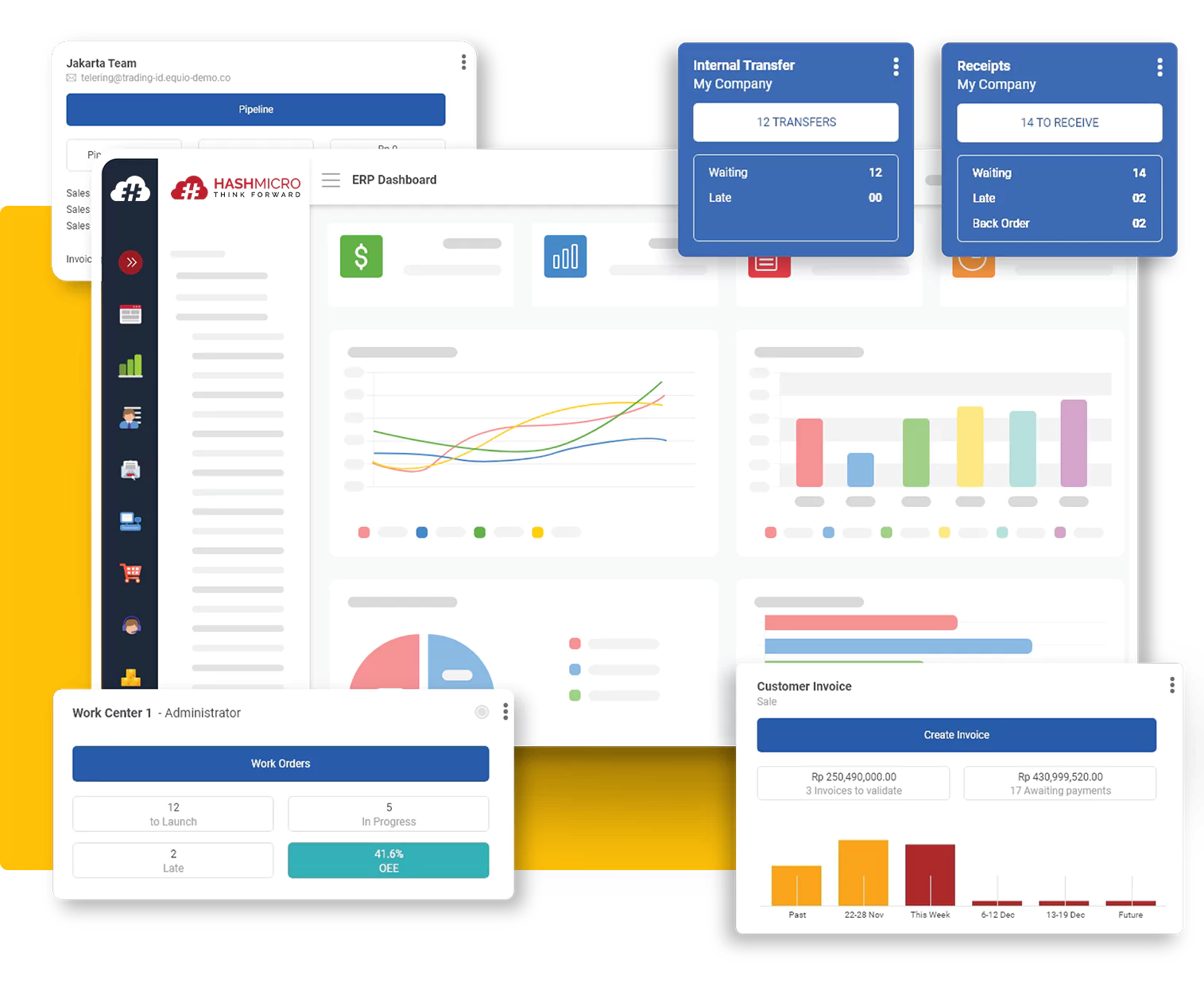When I first learned how companies boost efficiency, I realized how robust ERP and CRM systems can be. These tools simplify workflows, automate tasks, and help businesses make smarter, faster decisions.
ERP (Enterprise Resource Planning) integrates core operations like finance, inventory, and manufacturing into one centralized platform. With HashMicro’s ERP Software, teams stay connected through real-time data, ensuring smoother collaboration and fewer errors.
Meanwhile, CRM (Customer Relationship Management) helps manage customer interactions and build stronger relationships. When integrated with ERP, it creates a seamless ecosystem that drives productivity, transparency, and sustainable growth.
Key Takeaways
|
What is ERP?

ERP (Enterprise Resource Planning) is a software system organizations use to manage their business processes centrally. This software enables businesses to automate routine tasks, reducing the risk of human error and increasing efficiency.
The system also provides real-time information, allowing businesses to make informed decisions based on accurate data and insights. Implementing the best ERP software can be complex and costly.
Still, it can also bring significant benefits to businesses, including increased productivity, improved operational efficiency, better decision-making, and enhanced customer satisfaction.
What is CRM?
Customer Relationship Management software is helpful to help businesses build and maintain strong customer relationships by providing a centralized customer information database.
This software enables companies to improve customer engagement and retention by providing insights into customer behavior and preferences. It also can be customized to meet the specific needs of different industries and business sizes.
Implementing a this system can benefit businesses significantly, including improving customer satisfaction and loyalty, increasing sales, and making better decision based on real-time data and insights.
What are the Advantages of ERP?
Enterprise Resource Planning systems offer many advantages to businesses of all sizes and industries. One of the primary benefits of ERP is the ability to integrate different business functions and streamline operations.
Here are some other key benefits of ERP:
- Centralized Data: Manage inventory, finances, and customer information in one database to reduce duplication and simplify workflows.
- Better Collaboration: Shared access to real-time data helps teams coordinate more effectively across departments.
- Real-Time Insights: Get instant visibility into business performance and make faster, data-driven decisions.
- Higher Productivity: Automation and integration minimize manual work, improve efficiency, and let teams focus on strategic tasks.
What are the Advantages of CRM?
CRM (Customer Relationship Management) software offers several advantages to businesses looking to improve customer relationships and increase sales. One of the primary benefits of CRM is the ability to gain a 360-degree view of customers.
Here are some other key benefits of CRM:
- Personalized Customer Experience: Understand customers’ needs, preferences, and purchase history to deliver tailored interactions and exceptional service.
- Sales and Marketing Automation: Automate key processes like lead tracking, sales pipeline management, and marketing campaigns to save time and boost productivity.
- Efficient Lead Management: Track and nurture leads more effectively, ensuring smoother follow-ups and higher conversion rates.
- Data-Driven Decision-Making: Analyze customer trends and behavior patterns to create smarter, evidence-based sales and marketing strategies.
- Stronger Customer Relationships: With better insights and automation, businesses can focus on what truly matters to build long-term, loyal customer connections.
What are the Difference Between ERP and CRM?
ERP primarily focuses on internal business processes, including finance, production, inventory management, and procurement. It is designed to provide a comprehensive view of a company’s operations and can help businesses streamline their operations.
In contrast, CRM focuses on managing customer interactions and relationships. It enables enterprises to gain insights into customer behavior and preferences, tailoring their products and services to meet customers’ needs.
Another difference between ERP and CRM is their scope. Businesses across all industries typically use ERP and can be customized to meet the specific needs of different types of companies.
Businesses aiming to enhance customer engagement and drive sales growth can gsignificantlybenefit from a CRM system. At the same time, those seeking to streamline processes and achieve complete operational visibility will find ERP the ideal solution.
CRM and ERP Similarities
ERP and CRM are business applications designed to store and analyze data within a relational database. They can be implemented either on-premises or via a Software as a Service (SaaS) model, where the provider hosts the system in the cloud and users access it remotely.
Although both technologies emerged around the same time, CRM solutions transitioned to the cloud more rapidly, as they were simpler to develop and companies were initially hesitant to store sensitive financial information online.
Do I Need CRM or ERP or Both?
As companies grow, whether small, midsize, or large, they often reach a point where implementing both ERP and CRM systems, or a unified platform that combines them, becomes essential.
Businesses relying on basic accounting tools or spreadsheets typically upgrade to an ERP solution once those methods can no longer support their expanding operations or efficiency needs.
The same applies to organizations managing customer interactions through spreadsheets or individual email accounts; they eventually require a CRM system to centralize and optimize these processes.
The decision to adopt ERP or CRM first usually depends on the company’s structure and priorities, those with complex financial processes may prioritize ERP. At the same time, businesses with simpler finances but a larger, more active customer base often start with CRM.
Key Features of ERP vs. CRM
ERP and CRM systems must be able to exchange data seamlessly, and this is best achieved through direct integration rather than maintaining two separate databases. For instance, a sales representative might need to review an available credit before making an upsell offer.
Likewise, the finance team may need CRM data to calculate sales commissions or apply discounts to bulk orders. When CRM functions are built into an ERP platform, business leaders also gain a unified view of key metrics such as pricing models and lifetime value.
One process that highlights the importance of ERP–CRM integration is Configure, Price, Quote (CPQ), a function that depends on accurate, shared data from both systems. At the same time, many vendors offer prebuilt integrations to connect the two.
In contrast, an ERP system with a native CRM module offers clear advantages: lower implementation costs, real-time data synchronization, and stronger transactional processing capabilities.
Here is a table summary that dicusses key features of ERP vs. CRM
| ERP | CRM |
| Order Management | Sales Force Automation |
| Supply Chain Management | Marketing Automation |
| Production Management | Customer Service/Contact Centre |
| Financial Management/Accounting | Customer Self-Service |
| Procurement | Workflow Automation |
| Warehouse Management and Fulfilment/Inventory Management | Analytics and Reporting |
How to Choose the Best ERP & CRM System
 When choosing an Enterprise Resource Planning and Customer Relationship Management system, businesses must carefully consider their specific busuiness needs, goals, and budget.
When choosing an Enterprise Resource Planning and Customer Relationship Management system, businesses must carefully consider their specific busuiness needs, goals, and budget.
Selecting a flexible and customizable approach to meet your unique business requirements is essential. The systems should be integrated, giving businesses a holistic view of their operations and customer interactions.
Here are some essential tips to help you choose the right ERP and CRM system for your business:
- Understand Your Business Needs: Identify your company’s challenges and goals. Knowing what you need, such as better inventory control, sales tracking, or customer engagement, helps you select a system that truly fits.
- Look for Integration Capabilities: Choose software that allows seamless integration between ERP and CRM modules. This ensures smooth data flow across departments.
- Check for Customization Options: Every business is unique. Make sure the system can be tailored to match your processes, workflows, and reporting needs.
- Consider Scalability: Pick a solution that can grow with your business. The system should support additional users, modules, and data volume as your company expands.
- Evaluate User-Friendliness: A simple, intuitive interface encourages employee adoption and minimizes the need for extensive training.
- Assess Vendor Support and Reliability: Choose a trusted vendor that offers strong after-sales support, regular updates, and training to ensure smooth implementation.
- Review Cost vs. Value: Don’t just look for the cheapest option, focus on long-term value. A slightly higher investment can yield better features, efficiency, and ROI.
A better-suited option for businesses looking to integrate their ERP and CRM systems is HashMicro Software. Choosing suitable ERP and CRM systems for your business can significantly impact your bottom line.
Also read: ERP System Modules: Most Important Modules of ERP and Their Benefits!
Streamline Your Business Operations with HashMicro’s ERP System

HashMicro’s ERP System offers an all-in-one solution that integrates both ERP and CRM features, helping companies automate workflows, enhance collaboration, and drive sustainable growth.
Here’s how HashMicro can help streamline your business operations:
- Automated Financial Management: Simplify your accounting processes with automated journal entries, real-time reconciliation, and instant financial reporting.
- Centralized Data and Workflow: This integration reduces duplication of work and enhances communication between departments.
- Smart CRM Features: Strengthen customer relationships with features like contact management, sales pipeline tracking, and customer analytics.
- Marketing and Sales Automation: Automate marketing campaigns, follow-ups, and lead tracking to boost conversion rates.
- Customizable and Scalable System: HashMicro’s ERP System can be tailored to match your company’s structure and workflow. As your business grows, you can easily add new modules and users without disrupting existing operations.
Conclusion
In conclusion, ERP and CRM systems serve different yet equally vital functions in supporting business growth. While ERP focuses on optimizing internal operations, CRM enhances customer relationships and engagement.
HashMicro’s ERP System integrated ERP and CRM allow you to manage all your business processes seamlessly in one platform. Whether you aim to improve productivity or gain better insights, HashMicro provides a solution that fits your specific requirements.
HashMicro helps you streamline and grow your operations effectively. Take your business to the next level with our trusted solutions, get up to a 70% grant to kick-start your digital transformation journey and book a free demo today!
Frequently Asked Questions
-
Can ERP and CRM work together?
Yes. Many businesses integrate ERP and CRM to streamline customer data and operational workflows, resulting in better decision-making and enhanced customer experience.
-
Do ERP systems include CRM features?
Some ERP platforms offer built-in CRM modules. However, these features may not be as comprehensive as standalone CRM systems that focus exclusively on customer engagement.
-
Is CRM only for sales teams?
No. CRM benefits marketing, support, and customer success teams by centralizing all customer information to improve communication and retention strategies.


































